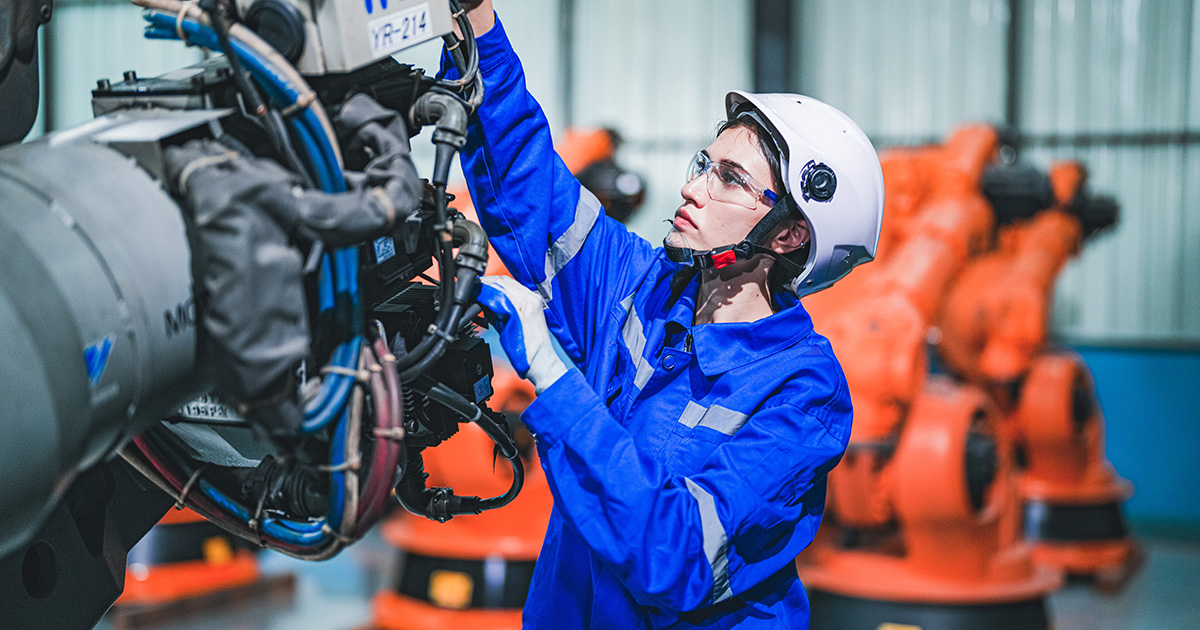Introduction to Automotive Technicians
Welcome to the exciting world of automotive technicians! If you have a passion for cars, problem-solving, and keeping engines running smoothly, then this is the career path for you. Automotive technicians play a vital role in diagnosing and repairing vehicles, ensuring that they are safe and reliable on the road.
In this blog post, we will dive into the skills and qualifications required to excel as an automotive technician. From technical expertise to customer service abilities, we’ll explore all aspects of this dynamic profession. So buckle up and let’s rev our engines as we explore what it takes to become an exceptional automotive technician!
Technical Skills Required for the Job
Technical Skills Required for the Job
Automotive technicians require a wide range of technical skills to excel in their field. These skills are crucial for diagnosing and repairing various vehicle issues.
First and foremost, a strong foundation in mechanical knowledge is essential. Technicians must have an understanding of how different car components work together, such as engines, transmissions, and suspension systems. They should also be skilled in performing routine maintenance tasks like oil changes and tire rotations.
In addition to mechanical expertise, automotive technicians must possess electrical and electronic knowledge. With the increasing reliance on technology in modern vehicles, technicians need to be able to diagnose and repair complex electrical systems, including wiring harnesses and computer-controlled components.
Diagnostic skills are another key requirement for automotive technicians. They must be able to identify the root cause of a problem by conducting thorough inspections and using diagnostic tools such as scanners or multimeters. This requires critical thinking abilities and attention to detail.
Furthermore, good customer service skills are important for automotive technicians who interact with customers regularly. Clear communication is necessary when explaining repairs or providing estimates to ensure that customers understand what needs to be done.
Physical stamina is required due to the physically demanding nature of the job. Technicians often spend long hours standing or kneeling while working on vehicles.
Possessing these technical skills sets automotive technicians apart in their profession by enabling them to effectively troubleshoot problems and provide high-quality repairs for their customers’ vehicles
Mechanical Knowledge and Expertise
Mechanical Knowledge and Expertise
As an automotive technician, having strong mechanical knowledge and expertise is essential. This skill set allows you to effectively diagnose and repair a wide range of mechanical issues in vehicles. From understanding how engines work to being able to identify problems with brakes or suspension systems, your mechanical expertise is the foundation of your success in this field.
One area where mechanical knowledge is particularly important is engine diagnostics. Being able to analyze engine performance, identify potential malfunctions, and troubleshoot complex issues requires a deep understanding of how different engine components interact with each other. A skilled technician can quickly pinpoint the root cause of an issue and efficiently make the necessary repairs.
Additionally, proficiency in areas such as transmission systems, exhaust systems, and cooling systems will greatly enhance your capabilities as an automotive technician. Understanding how these systems function enables you to accurately diagnose problems and perform repairs that restore optimal performance.
With advancements in technology, it’s also crucial for technicians to stay updated on the latest developments in vehicle mechanics. This includes staying knowledgeable about hybrid or electric vehicle technology as well as advancements in fuel efficiency features.
Possessing solid mechanical knowledge and expertise sets you apart as a competent automotive technician who can tackle any challenge that comes your way!
Electrical and Electronic Knowledge
Automotive technicians not only need mechanical expertise, but they also must possess a strong understanding of electrical and electronic systems in vehicles. This knowledge is crucial because modern cars are increasingly reliant on complex electrical components.
Automotive technicians must be able to diagnose and repair issues with the car’s electrical system. This includes troubleshooting problems with the battery, alternator, starter motor, wiring harnesses, and various sensors. They need to have a good grasp of circuitry and understand how electricity flows through different parts of the vehicle.
They should be familiar with electronic control modules (ECMs) used in today’s cars. These ECMs regulate various functions such as fuel injection timing, transmission shifting patterns, and engine performance. Technicians need to know how to use diagnostic tools to communicate with these modules and interpret error codes for effective troubleshooting.
Additionally, technicians should have knowledge of advanced features found in modern vehicles like anti-lock braking systems (ABS), traction control systems (TCS), airbag systems, and advanced driver-assistance systems (ADAS). Understanding these sophisticated electronics allows them to properly maintain and repair these safety features.
To stay current in this ever-evolving field, automotive technicians must regularly update their knowledge on new technologies emerging in the automotive industry. Continuous learning is essential as manufacturers introduce innovative electrical components that require specialized skills for diagnosis and repair.
In conclusion: A solid foundation in electrical and electronic knowledge is fundamental for automotive technicians today due to the increasing complexity of vehicle technology. By staying up-to-date on advancements in this field through continuous education opportunities or manufacturer training programs, professionals can ensure they have the necessary skills to effectively address any electrical issue that arises while working on customer vehicles.
Diagnostic Skills
Diagnostic skills are crucial for automotive technicians as they play a pivotal role in identifying and solving vehicle issues. These skills involve the ability to analyze complex systems, troubleshoot problems, and use diagnostic equipment effectively.
One important aspect of diagnostic skills is the technician’s ability to interpret error codes generated by onboard computer systems. This requires a deep understanding of how different components interact with each other and impact overall system performance. By accurately deciphering these codes, technicians can pinpoint the root cause of an issue more efficiently.
Additionally, strong problem-solving abilities are essential for effective diagnostics. Automotive technicians must possess logical thinking and analytical skills to identify patterns, isolate potential causes, and develop appropriate solutions.
Moreover, attention to detail is paramount in this field. Technicians need to be meticulous when inspecting vehicles, looking for any signs or symptoms that may indicate underlying problems.
Having good communication skills is also vital when it comes to diagnostics. Technicians must be able to effectively communicate their findings with customers and colleagues alike. This not only helps build trust but also ensures everyone involved understands the necessary repairs or maintenance required.
Diagnostic skills encompass various aspects such as interpreting error codes, problem-solving abilities, attention to detail, and effective communication. These qualities enable automotive technicians to diagnose vehicle issues accurately and provide efficient solutions for their customers’ needs
Customer Service and Communication Abilities
Customer Service and Communication Abilities are essential skills for automotive technicians to possess. In addition to their technical expertise, these professionals must also be able to effectively communicate with clients and provide excellent customer service.
One important aspect of customer service is being able to listen attentively to the concerns and questions of clients. Automotive technicians need to have good listening skills in order to fully understand the issues that customers are experiencing with their vehicles. This allows them to accurately diagnose and address any problems.
In addition, effective communication is crucial when explaining complex technical information to clients. Automotive technicians should be able to clearly and concisely explain what repairs or maintenance tasks are needed, as well as why they are necessary. They should also be able to answer any questions that customers may have about the work being done.
Furthermore, strong interpersonal skills are beneficial in building trust and rapport with customers. Being friendly, approachable, and respectful can help create a positive experience for clients who may already be feeling stressed or frustrated due to vehicle problems.
Customer service and communication abilities play a vital role in ensuring client satisfaction in the automotive repair industry. By possessing these qualities, automotive technicians can not only excel at their job technically but also provide an exceptional level of service that keeps customers coming back.
Physical and Mental Requirements
Physical and Mental Requirements
Being an automotive technician is physically demanding. Technicians are often required to lift heavy parts and equipment, crawl under vehicles, and work in tight spaces. They need to have good manual dexterity and hand-eye coordination to perform tasks such as tightening bolts or connecting electrical wires.
In addition to the physical demands of the job, automotive technicians also need to be mentally sharp. They must have strong problem-solving skills and be able to think critically when diagnosing issues with vehicles. This requires them to analyze symptoms, run tests, and determine the root cause of problems.
Attention to detail is crucial in this profession as well. Technicians must pay close attention while inspecting vehicles for potential issues or performing repairs. Missing a small detail could lead to major problems down the road.
Additionally, being an automotive technician requires good communication skills. Technicians often interact with customers who may not understand technical jargon or may be frustrated by vehicle issues. It’s important for technicians to effectively communicate diagnoses, repair options, and costs in a way that customers can understand.
Automotive technicians need both physical stamina and mental agility to excel in their field. Their ability to perform physically demanding tasks while remaining focused on complex problem-solving sets them apart as skilled professionals in the industry.
Education and Training Requirements
Education and Training Requirements
When it comes to becoming an automotive technician, having the right education and training is essential. While some individuals may start out with a high school diploma or equivalent, most employers prefer candidates who have completed formal postsecondary programs in automotive technology.
These programs can be found at community colleges, vocational schools, and technical institutes. They typically offer coursework that covers both theory and hands-on practice in areas such as engine repair, transmission systems, brake systems, electrical systems, and more.
In addition to classroom instruction, aspiring technicians also benefit from practical experience gained through internships or apprenticeships. These opportunities allow them to work under the guidance of experienced professionals while gaining real-world knowledge and skills.
Furthermore, many manufacturers and organizations offer specialized training programs for their specific makes or models of vehicles. These programs provide technicians with advanced training on specific diagnostic tools or technologies used by these manufacturers.
Keeping up with advancements in automotive technology is crucial for staying competitive in this field. Therefore, ongoing education through workshops, seminars, online courses, or manufacturer-sponsored trainings is highly recommended for automotive technicians.
By continuously updating their knowledge base and skill set throughout their careers,
technicians can expand their job prospects and potentially qualify for higher-paying positions within the industry
Certifications and Licenses
Certifications and licenses play a crucial role in the automotive technician profession. These credentials not only validate the skills and knowledge of technicians but also ensure that they are up-to-date with industry standards and practices.
One important certification for automotive technicians is ASE (Automotive Service Excellence) certification. This nationally recognized credential demonstrates proficiency in various areas such as engine repair, brakes, electrical systems, and more. Obtaining an ASE certification can enhance job prospects and increase earning potential.
In addition to ASE certification, there are other specialized certifications available for specific areas of expertise within the automotive field. For example, technicians working on hybrid or electric vehicles may pursue certifications from manufacturers like Toyota or Tesla to demonstrate their competence in handling these advanced technologies.
Moreover, many states require automotive technicians to hold a valid driver’s license due to the nature of their work. A clean driving record is often necessary as well since technicians may need to test drive vehicles after repairs or perform road tests during diagnostic procedures.
By obtaining relevant certifications and licenses, automotive technicians showcase their commitment to professionalism and continuous learning. These credentials not only provide credibility but also help build trust with customers who value certified professionals working on their vehicles. So whether it’s an ASE certification or a specialized license, investing in these qualifications can open doors to new opportunities in the ever-evolving automotive industry.
On-the-Job Training Opportunities
On-the-Job Training Opportunities
One of the great benefits of pursuing a career as an automotive technician is the availability of on-the-job training opportunities. These opportunities allow aspiring technicians to gain practical experience and learn from experienced professionals in a real-world setting.
During on-the-job training, new technicians are able to apply their knowledge and skills learned in the classroom to actual vehicles. They have the chance to work alongside seasoned technicians who can provide guidance and mentorship.
This hands-on experience is invaluable for developing proficiency in diagnosing and repairing various vehicle issues. It also helps technicians become familiar with different types of equipment, tools, and technologies used in the industry.
On-the-job training allows new technicians to build confidence and develop problem-solving abilities. They learn how to efficiently troubleshoot problems, make accurate diagnoses, and implement effective solutions. This practical experience enhances their overall competence as automotive professionals.
In addition to technical skills, on-the-job training provides an opportunity for aspiring automotive technicians to hone their customer service abilities. They interact directly with customers while discussing vehicle issues or explaining repair procedures. This interaction strengthens communication skills that are vital when dealing with clients in a professional manner.
Furthermore, on-the-job training exposes entry-level technicians to various aspects of running an automotive repair shop or dealership service department. They may gain insight into inventory management, scheduling repairs, completing paperwork accurately, ordering parts efficiently, and providing excellent customer experiences.
On-the-job training offers invaluable learning experiences that cannot be replicated solely through classroom instruction or textbook reading. It allows aspiring automotive technicians to bridge the gap between theoretical knowledge gained during formal education and practical application in real-world scenarios.
The Importance of Continuing Education in the Field
Continuing education is an essential aspect of being a successful automotive technician. In this rapidly evolving field, staying up-to-date with the latest advancements and technologies is crucial. By constantly learning and expanding their knowledge base, technicians can provide better service to their customers and ensure that they are equipped to handle any issue that comes their way.
One of the main reasons why continuing education is important for automotive technicians is because it allows them to keep pace with the ever-changing landscape of vehicles. With new models being released each year, as well as advancements in technology such as electric and hybrid vehicles, it’s important for technicians to stay informed about these developments.
Additionally, continuing education provides opportunities for technicians to learn about new diagnostic tools and equipment that can improve their efficiency and accuracy in diagnosing vehicle issues. This not only saves time but also ensures that repairs are done correctly the first time around.
Furthermore, ongoing training helps technicians stay current with safety regulations and industry standards. As vehicles become more complex, it’s important for technicians to understand how to properly handle advanced systems like airbags or electronic stability control. By keeping up with safety protocols through continuous education, they can ensure they are providing safe service to their customers.
Continuing education can open doors for career advancement opportunities. By acquiring specialized certifications or completing additional training courses, automotive technicians can demonstrate their expertise in specific areas such as hybrid technology or diesel engines. This expertise not only makes them more valuable employees but also increases their earning potential.
In conclusion,
continuing education plays a vital role in the success of automotive technicians.
By staying current with industry trends,
acquiring new skills,
and expanding knowledge,
technicians can provide exceptional service
and position themselves for future growth.
It’s clear that investing in ongoing training is a wise decision
that benefits both individual professionals
and the overall quality of work within the automotive repair industry
Advancement Opportunities for Automotive Technicians
Advancement Opportunities for Automotive Technicians
As an automotive technician, there are numerous opportunities for professional growth and advancement. With the right skills, experience, and dedication to continuous learning, you can take your career to new heights in the automotive industry.
One of the most common paths for advancement is becoming a specialized technician. By focusing on specific areas such as electrical systems, transmissions, or diesel engines, you can become an expert in your chosen field. This specialization not only allows you to work on more complex vehicles but also opens doors to higher-paying positions.
Another avenue for advancement is moving into a supervisory or managerial role. As you gain experience and demonstrate leadership qualities, you may have the opportunity to oversee a team of technicians or manage an entire service department. These positions require not only technical know-how but also excellent organizational and communication skills.
For those who enjoy teaching and sharing their knowledge with others, becoming a trainer or instructor could be a fulfilling path. Many automotive manufacturers and training institutions offer positions where experienced technicians can pass on their expertise to aspiring technicians.
Furthermore, some technicians choose to start their own businesses after gaining enough experience in the field. Opening an independent repair shop allows them to have more control over their work environment while potentially earning higher profits.
Advancements can also come through pursuing further education and obtaining additional certifications. By staying up-to-date with technological advancements in the industry and expanding your skill set through training programs or courses at colleges or vocational schools, you increase your marketability as a technician.
In conclusion,
The automotive industry offers various avenues for professional growth and career advancement for skilled automotive technicians willing to put in the effort necessary to achieve success.
With options like specializing in specific areas of expertise,following supervisory roles,becoming trainers,independent business owners,and continuing education,the sky’s truly limit with opportunities available.
Never settle when it comes advancing within this dynamic field;keep pushing yourself towards new horizons!
Conclusion
Conclusion
Becoming an automotive technician requires a unique set of skills and qualifications. From mechanical knowledge to diagnostic abilities, these professionals play a crucial role in keeping our vehicles running smoothly.
To excel in this field, individuals need to continuously update their skills through education and training programs. Certifications and licenses are also essential for demonstrating expertise and credibility.
Moreover, on-the-job training opportunities provide valuable hands-on experience that can further enhance an automotive technician’s skillset. By staying up-to-date with advancements in technology and industry standards, technicians can adapt to the evolving needs of modern automobiles.
For those who possess the necessary skills and qualifications, there are numerous advancement opportunities available within the automotive industry. Whether it’s specializing in a particular vehicle brand or pursuing management positions, skilled technicians can carve out successful careers.
A career as an automotive technician is not only rewarding but also offers stability and growth potential. With the right combination of technical expertise, customer service skills, and ongoing education, aspiring technicians can thrive in this dynamic field. So if you have a passion for cars and enjoy problem-solving challenges every day – why not consider becoming an automotive technician?




